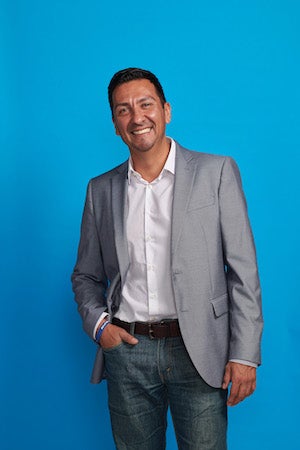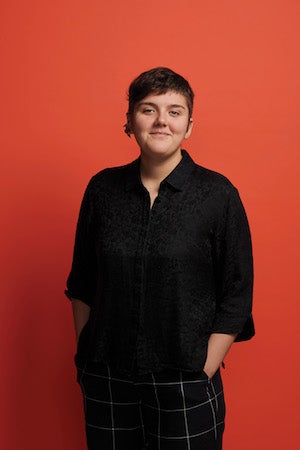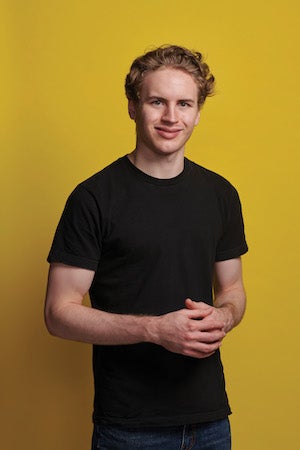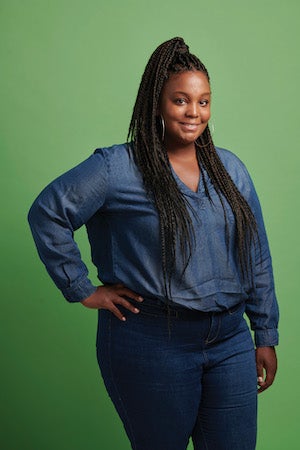features
Transformative Experiences
Changing lives, one humanities course at a time
Meet Agustín Torres, Giorgi DeVito, Andrew Gliebe and Sharmayne Schaffer.
They've all participated in the Cleveland Humanities Collaborative (CHC), which launched in 2014 with support from the Andrew W. Mellon Foundation. The initiative helps ease the transition to Case Western Reserve University for qualified students from Cuyahoga Community College (Tri-C) keen to earn a bachelor's degree in the humanities.
It also helps make a four-year degree more accessible for students juggling school with parenthood or full-time jobs, returning to school after time away—or who believed the university was beyond their reach academically or financially.
For many students, it's opened new worlds. Here are some of their stories.
To learn more about the Cleveland Humanities Collaborative, visit chc.case.edu.
 PHOTO: Roger Mastroianni
PHOTO: Roger MastroianniAgustín Torres plans to graduate from the university with a degree in Spanish this coming May. Originally from Veracruz, Mexico, he received the Emile B. DeSauze Award for highest honors from the Department of Modern Languages and Literatures. He spent part of the summer in Mexico, doing academic research on the contributions of Africans in the colonialism of Veracruz during the early 16th century and spoke to some of their descendants about how they keep their culture alive.
"In 1996, I was working as a bartender at the Hard Rock Cafe in Cancun, Mexico, and got transferred to their new Cleveland location [also as a bartender]. I did well enough to open my own Mexican restaurant with some partners. In 2008, the restaurant was raided by [federal agents for having undocumented workers]. I lost everything—my restaurant, my car, and a majority of my finances.
—Agustín Torres
"Then I learned [from my probation officer] about a program to get my GED [high school equivalency diploma]. For six months, I rode my bike from Lakewood to Cleveland to take the classes. After I got my GED, I enrolled in Tri-C, and that's where I saw a flyer for the CHC. I was a Mandel Scholar* so it got my attention. I became a concurrent student at Case [Western Reserve] and Tri-C. At first, I was intimidated. English is not my native language, and now I was taking English 300-[level] classes, trying to decipher Shakespeare [at the age of 45].
"At my age, it's challenging being a full-time student. I work 50 to 60 hours a week as a bartender to make money to send to my mother and sister in Mexico. Sometimes I do my homework at work and submit my essays through my iPhone. Then I do more work at home.
"I believe education is a way out. When I was in jail, I asked God for mercy. I said, 'Give me one chance.' The CHC was my chance.
"After graduation, I'm not sure what I'll do. I am thinking of going to graduate school. I believe in myself now more than ever before. I really want to make a difference in other people's lives. The CHC has really been the pillar I needed to support my experience at Case [Western Reserve]. I see the provost [Ben Vinson III, PhD] on campus and he speaks to me in Spanish. It's like a dream."
 PHOTO: Roger Mastroianni
PHOTO: Roger MastroianniGiorgi DeVito is majoring in history and minoring in sociology and art studio, plans to graduate in 2020, and may continue working with the Northern Ohio Detention Support Network, a nonprofit DeVito co-founded that supports immigrants in detention.
"After high school, I did a lot of different jobs and saved a lot of money. I had an aunt who wanted me to go to college, but I wasn't thinking of going to a university. My parents actually wanted me to go to art school.
"I worked as a baker, a dog groomer, a florist. I went to Tri-C because I wanted to learn a trade, get some supplemental job skills so I could get a license to do construction work. I thought I'd take entry-level math and English, but I ended up in a sociology class. It was really notable for me [because] the people in my classes were almost all adults going to school while raising families, work-ing full-time jobs. It was really inspiring being in class with people who had not been in school all their lives. Talking about sociology with them was just awesome.
—Giorgi DeVito
"My grades were good, so I applied to the CHC. At Case [Western Reserve], I switched to a history major and started studying the roots of social inequalities. I learned about the history of colonization, which is so crucial to understanding why so many people are currently incarcerated. I was very interested in prisoner support and co-founded the Northern Ohio Detention Support Network. Studying history and sociology helped me understand the 'why' of it.
"The CHC is incredibly valuable in bringing people who have outside experiences into Case [Western Reserve]. The people who go to [college] will become the people with social power, which is why it's so important they have exposure to people with different life experiences. I do think the students at Case [Western Reserve] are becoming aware of the CHC program and appreciate what the Tri-C students bring to campus.
"After I graduate, I want to get more involved in my community. I want to address social issues that came up in many of my classes. My own transition from Tri-C to Case [Western Reserve] has shown me that life experience is crucial as a foundation to building research knowledge. I like my classmates and I've liked my experience—I just wish all the people I went to Tri-C with could follow me."
 PHOTO: Roger Mastroianni
PHOTO: Roger MastroianniAndrew Gliebe (CWR '19) majored in history and graduated cum laude, with a 3.79 grade point average. In the spring, he and Hannah Pomerantz (CWR '19) shared the Department of History's Annie Spencer Cutter Prize, which recognizes a "senior for outstanding achievement in history."
"I went to Tri-C straight out of high school. I had the grades to go to a university, but my goal was to graduate debt-free. My parents' net income would be considered lower-middle class.
"My plan was to get my bachelor's degree from Cleveland State [University]. I'm a native Clevelander, but Case [Western Reserve] never factored into my equation. Then I got an email saying I was qualified for the CHC. My support group knew that I had lowered my standards in my personal life, including living expenses, to earn a bachelor's degree debt free. However, they still encouraged me to reach my highest academic potential. After meeting with CWRU's financial aid office, I realized that it was possible to make those who believed in me proud, by attending one of the best schools in the region.
—Andrew Gliebe
"The most important part of the CHC for me was the summer bridge program, where CHC students meet on the Case [Western Reserve] campus every day. You learn the ins and outs of the campus, meet with faculty, find out about resources and course offerings. By the end of the program, I felt very comfortable.
"The transition was rough at first, though. I took five courses my first semester, and at midterms I had three Bs, a C and a D. At Tri-C, I'd had a 3.7 GPA. I was overwhelmed, but I managed to end the semester with two As and three Bs, and my second semester I had a 4.0. There was definitely a learning curve.
"I had been working at the Cleveland Public Library [through high school and college] and was planning to stay after graduation as a librarian assistant, but Professor Michael Goldberg [an associate professor of design and innovation] acted as a career mentor and recommended I look into a private-sector job. I recently received an offer to work as a mortgage banker and I'm excited for the opportunity to apply my work ethic in the private sector.
"CHC gives [funding for research], so over spring break of my final semester, I went to Milan, Italy. I had never been overseas or even on a plane, for that matter. My plans were to live in Cleveland for the rest of my life, but now I feel that opportunities can be found anywhere."
 PHOTO: Roger Mastroianni
PHOTO: Roger MastroianniSharmayne Schaffer (CWR '18) graduated magna cum laude, double-majoring in women's and gender studies and sociology, and was the first student to complete the CHC program. She's a social worker for the Cuyahoga County Department of Children and Family Services and aspires to open a nonprofit for economically disadvantaged women and children of color in Cleveland.
"I graduated from high school in 2004 [and] went to John Carroll University, but I had to leave because of financial reasons. It took me 10 years to get back to school. I went to Tri-C because it was affordable. I was president of the [school's] honors society and a Mandel Scholar* and really into social justice issues. My adviser suggested the CHC program. When I saw it was at Case [Western Reserve] I was excited, but a little nervous because, while I did well academically, I never thought of applying to such a prestigious school. But I got in.
"During my first year, I took classes on race, class and gender. Allison [Morgan (GRS '11, art history), CHC's program manager] was one of my biggest supporters.
—Sharmayne Schaffer
"A professor suggested I minor in sociology, and I wound up majoring in it. Before I graduated, people would say, 'You know you don't get your dream job right out of school.' But I had three job offers right away. [In addition,] I had applied for a county job with Children and Family Services. The one thing they wanted to talk about in my interview was a study I conducted at Case [Western Reserve] on the difference in media portrayals of black and white drug-addicted mothers. I got the job. I was floored. Now I work with abused and neglected children.
"Before going to [the university], I never really questioned a lot of things. But now I love to look at the world critically, which helps me so much in my role as a social worker. I used to hate writing so many papers for class, but now when I have to write assessments for my job, I'm zooming through them because I did so much writing at Case [Western Reserve].
"A lot of times, students at Tri-C don't see [their] potential. Before the CHC program, I doubted myself. Maybe I wouldn't have even clicked on the application for my job otherwise, but I was like, 'I come from Case [Western Reserve]. I'm a social worker.' I never thought I'd be able to say that."
*The Mandel Scholars Academy at Cuyahoga Community College nurtures future leaders with academics, seminars and events focused on civic and community engagement.





